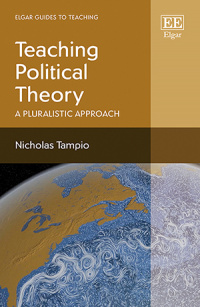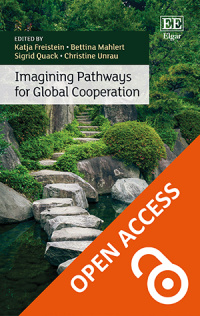Hardback
Handbook of Qualitative Cross-Cultural Research Methods
A Social Science Perspective
9781800376618 Edward Elgar Publishing
This Handbook provides an in-depth discussion on doing cross-cultural research more ethically, sensibly and responsibly with diverse groups of people around the globe. It focuses on cross-cultural research in the social sciences where researchers that are often from Western, educated and rich backgrounds are conducting research with individuals from different socio-cultural settings that are often non-Western, illiterate and poor.
More Information
Critical Acclaim
Contributors
More Information
This Handbook provides an in-depth discussion on doing cross-cultural research more ethically, sensibly and responsibly with diverse groups of people around the globe. It focuses on cross-cultural research in the social sciences where researchers that are often from Western, educated and rich backgrounds are conducting research with individuals from different socio-cultural settings who are often non-Western, illiterate and poor.
Covering both theoretical perspectives as well as practical ways to conduct research in cross-cultural settings, the contributors explore research work across Africa, Asia, Australasia, Europe and North America. Chapters provide keen insights into Indigenous research methods and approaches to cross-cultural research with a range of different groups of Indigenous peoples, highlighting the ethical and methodological challenges for researchers conducting cross-cultural research. Top scholars in the field suggest practical tips and information on lessons they have learnt to make this a useful tool kit for early-career researchers and students.
This will be a critical read for students of development studies, transnational studies and anthropology who are interested in pursuing cross-cultural research in diverse settings. It is also an invigorating read for researchers who conduct cross-cultural research as well as those who work with people from ethnic minorities and refugees.
Covering both theoretical perspectives as well as practical ways to conduct research in cross-cultural settings, the contributors explore research work across Africa, Asia, Australasia, Europe and North America. Chapters provide keen insights into Indigenous research methods and approaches to cross-cultural research with a range of different groups of Indigenous peoples, highlighting the ethical and methodological challenges for researchers conducting cross-cultural research. Top scholars in the field suggest practical tips and information on lessons they have learnt to make this a useful tool kit for early-career researchers and students.
This will be a critical read for students of development studies, transnational studies and anthropology who are interested in pursuing cross-cultural research in diverse settings. It is also an invigorating read for researchers who conduct cross-cultural research as well as those who work with people from ethnic minorities and refugees.
Critical Acclaim
‘The book provides an impressive and comprehensive set of views and methodological perspectives on how to be a true respectful and culturally sensitive cross-cultural researcher. Pranee Liamputtong has assembled a diverse group of contributors that include academics, field researchers and indigenous people; describing different approaches that range from community art to gardening. A must read!’
– Maurizio Trevisan, VinUniversity, Vietnam
‘This seminal book makes the critical contribution that cross-cultural research traditions are valid on and of their own. It is a major deconstruction of research approaches that privilege coloniality perspectives, challenging the predominant western research approaches and interpretations, and inviting alternative research culture values and orientations. Readers will gain new insights on the undoing of the neo-colonial polemics that inclusiveness and diversity in scholarly traditions is not just politics interfering with research practices, but that the research enterprise in the social sciences, like the personal, is political. The book makes the compelling argument that imported research traditions to cultural communities underplay or are dismissive of the real harm of coloniality to constructing authentic knowledge of and for cultural communities. This Handbook makes a clear, logical build-up to theoretical and conceptual frameworks of cross-cultural research approaches in the context of contemporary literature and elaborates on the implications of indigenist traditions for research practice, training, policy, and future directions.’
– Elias Mpofu, University of North Texas, US; University of Sydney, Australia; and University of the Witwatersrand, South
Africa
‘Professor Liamputtong has created a landmark work that will be essential reading for ALL researchers. This book addresses the most complex challenges we have in international research today – of equity, diversity, inclusion, indigeneity, and accessibility. A powerful and needed work for the times.’
– Allan Kellehear, University of Vermont, US
– Maurizio Trevisan, VinUniversity, Vietnam
‘This seminal book makes the critical contribution that cross-cultural research traditions are valid on and of their own. It is a major deconstruction of research approaches that privilege coloniality perspectives, challenging the predominant western research approaches and interpretations, and inviting alternative research culture values and orientations. Readers will gain new insights on the undoing of the neo-colonial polemics that inclusiveness and diversity in scholarly traditions is not just politics interfering with research practices, but that the research enterprise in the social sciences, like the personal, is political. The book makes the compelling argument that imported research traditions to cultural communities underplay or are dismissive of the real harm of coloniality to constructing authentic knowledge of and for cultural communities. This Handbook makes a clear, logical build-up to theoretical and conceptual frameworks of cross-cultural research approaches in the context of contemporary literature and elaborates on the implications of indigenist traditions for research practice, training, policy, and future directions.’
– Elias Mpofu, University of North Texas, US; University of Sydney, Australia; and University of the Witwatersrand, South
Africa
‘Professor Liamputtong has created a landmark work that will be essential reading for ALL researchers. This book addresses the most complex challenges we have in international research today – of equity, diversity, inclusion, indigeneity, and accessibility. A powerful and needed work for the times.’
– Allan Kellehear, University of Vermont, US
Contributors
Contributors include: Anna Adcock, Anson Au, Alexandra Brewis, Clifford T. Ballantyne, Jennifer Buckle, Richard Chenhall, Fiona Cram, Ranjan Datta, Danila D’Errico, Sonya Corbin Dwyer, Fran Edmonds, Gabriele Griffin, Nigel Hunt, Alison Hutchinson, Mpoe Johannah Keikelame, Carolyn M. Melro, Emily Mundo-Harrison, Lieketseng Ned, Rinchen Pelzang, Grace Sarra, Roseanne Schuster, Cindi Sturtz Sreetharan, Marnee Shay, Johanna Söderström, Leslie Swartz, Nisha Toomey, Heather Wallace, Annette Woods, Amber Wutich





